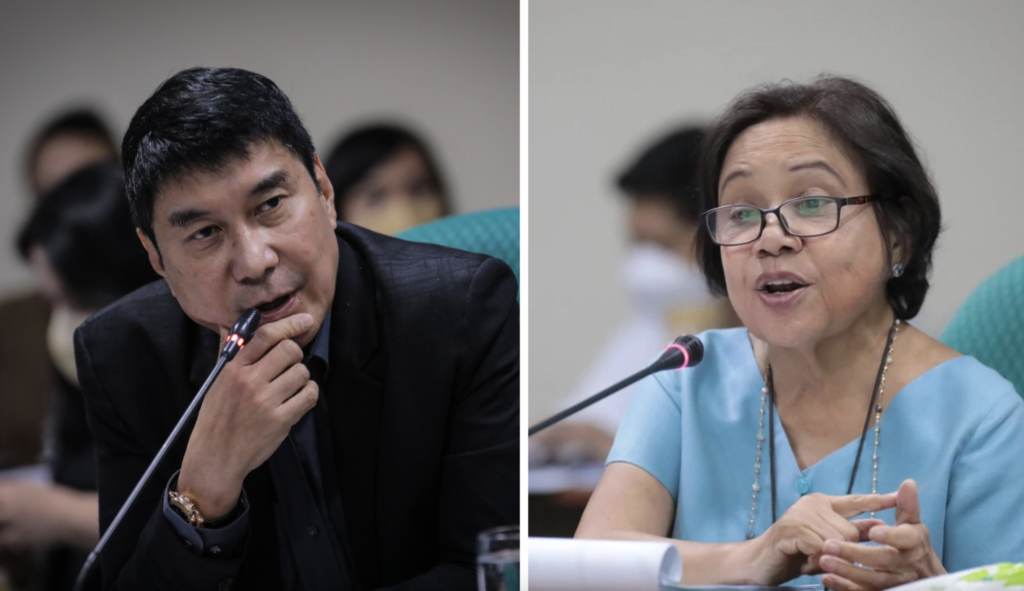Tulfo, Villar clash over farmlands conversion into subdivisions, commercial areas

FILE PHOTO: Senator Raffy Tulfo and Senator Cynthia Villar. INQUIRER FILES
MANILA, Philippines — Senators Raffy Tulfo and Cynthia Villar have figured in a verbal exchange over the conversion of farmlands into residential or commercial areas during plenary deliberations on the 2023 budget of the Department of Agriculture (DA).
Tulfo first inquired about DA’s efforts to address the decreasing number of farmlands in the country. Villar, the sponsor of the proposed P160.85 billion budget of the DA for next year, responded with a seeming explanation of how her family’s business acquired lands to develop into residential or commercial ventures.
“Lumiliit nang lumiit ang ating farmlands binibili po ng malalaking developer at ginagawang commercial at residential land. Ano po ang ginagawa ng DA tungkol dito?” Tulfo asked.
(Farmlands are getting smaller and smaller as big developers buy them and convert them into commercial and residential lands. What is the DA doing about this?)
Villar, whose family owns and runs property developer Vista Land & Lifescapes which projects include subdivisions and malls, replied: “Alam niyo, that’s our business.”
But she quickly explained that they do not buy agricultural land in the provinces as, “Nobody will buy houses in agricultural lands. We only buy in cities and capital towns because the buyers of houses, they also want an opportunity that if they’re having financial problems, they can resell their houses. It’s very hard to resell houses not in cities or capital towns. So we limit ourselves in cities and capital towns.”
“They allow conversions in cities and capital towns because if they buy your land, they buy it expensive. And you can re-invest the money, and you will make more money than planting on those lands,” Villar then pointed out.
She even recalled her family’s previous decision to develop their eight-hectare chicken farm in Muntinlupa City after learning that they “will make more money [in this] than in farming.”
“It’s an investment decision for these people. If somebody will buy your land at a bigger amount, you can sell it and buy another land that is cheaper somewhere else and build your farm there. You have to understand agriculture as a business also,” Villar added.
But Tulfo said Villar’s response was not answering his question. He repeated his assertion that many farmlands in the country have been commercialized.
Then Villar interjected: “Where will the people live if you don’t build subdivisions?”
Tulfo replied by pointing out that there are many other areas where these subdivisions can be constructed.
“Huwag lang po i-take over iyong mga farm kasi nga, kung minsan, iyong mga farmer, dahil sila’y naghihikahos, they’re being taken advantage of,” he argued.
(Just don’t take over the farms because sometimes, the impoverished farmers are being taken advantage of.)
The neophyte senator also noted that due to the rice tariffication law (RTL), which liberalizes the importation of rice, farmers are often pushed to sell their lands due to tight financial situations.
Villar, who was also among the authors of the RTL, said that when she drafted the law in 2018, the price of rice was about P50 to P60 per kilo.
“That was the only time President [Rodrigo] Duterte became unpopular. Because rice is a political crop. When nagmamahal ang rice, nagiging unpopular ang President (When rice prices go up, the President becomes unpopular),” she said.
Villar also insisted that passing the RTL was a crucial step in bringing down the country’s credit rating.
“We have plenty of loans abroad and we have to pay higher interest for those loans so it will be a loss for the Philippine government,” she explained.
The senator also noted that money collected from rice tariffs were all given to small rice farmers.
“I don’t feel any guilt for the small farmers. All the money that came from the rice tariffication law were given to the small farmers owning two hectares and below,” she said.
Villar further asserted: “We need the residential and commercial areas to improve the quality of the lives of our people. It’s not the amount of farmlands. It’s the efficiency of using these farmlands.”
According to her, the amount of farmlands was not the issue but the country’s outdated agricultural model particularly in the quality of seedlings planted and the traditional farming process.
But for Tulfo, this calls for the need to pass the long-overdue National Land Use Act which aims to create a national land-use plan.
Villar, however, pointed out that land use plans are already in place at the level of the local government.
Both senators again argued about which government level of land use management is most optimal, prompting Senate President Miguel Zubiri to move for a minute-long suspension.
Tulfo ended his interpellation shortly after the resumption of the session, but he said he will soon deliver a privilege speech on the National Land Use Act.
Senate plenary session on the 2023 national budget started Wednesday, November 16, and extended until early Thursday morning.
RELATED STORIES
Villar to start listing power, infra assets via P3.2-B IPO in November
Senator Tulfo’s proposal: No 13th-month pay to workers? No business permit renewal
Disclaimer: The comments uploaded on this site do not necessarily represent or reflect the views of management and owner of Cebudailynews. We reserve the right to exclude comments that we deem to be inconsistent with our editorial standards.
